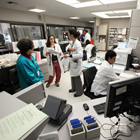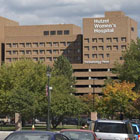 Hospitals play an enormous financial role in the U.S. health care system, gobbling up more than 30 cents of each dollar spent. This year, total spending on hospital care is expected to reach more than $788 billion — out of a national health tab of $2.6 trillion, according to government estimates.
Hospitals play an enormous financial role in the U.S. health care system, gobbling up more than 30 cents of each dollar spent. This year, total spending on hospital care is expected to reach more than $788 billion — out of a national health tab of $2.6 trillion, according to government estimates.
The industry, struggling to emerge from a recession that created serious financial strains, isn’t a monolith. Some community hospitals are scrambling to stay independent, or even survive. But hospital costs continue to grow faster than inflation. One reason: Some big brand-name medical systems are increasing their already-substantial negotiating clout with insurers. The rise in prices is driving up the cost of care and insurance at a time when the federal government is preparing to subsidize private coverage for millions of Americans, under the new health law.
In this occasional series, Kaiser Health News examines trends affecting consumers, employers, insurers, doctors and communities.
 Hospitals Face New Pressure To Cut Infection Rates
Hospitals Face New Pressure To Cut Infection Rates
Sarah Varney
May 28, 2011
Under laws in more than two dozen states and new Medicare rules that went into effect earlier this year, hospitals are required to report infections, risking their reputations as sterile sanctuaries, or pay a penalty. That’s left hospital administrators weighing the cost of ‘fessing up against the cost of fines.

Big Hospitals Dictate Premiums Using Their Clout
Sarah Varney
November 22, 2010
Hospital prices in the Sacramento region are among the highest in California, driven in large part by the negotiating clout of the hospital chain Sutter Health.

As Hospital System Expands, Patient Advocates Worry
Jordan Rau
November 21, 2010
Through new construction and expanding its doctors’ groups, Sutter Health is enhancing its position as one of the most dominant hospital systems in California. In addition, Sutter is further ahead of many competitors in fashioning itself into a so-called accountable care organization, responsible for coordinating care between hospitals, specialists and primary doctors. See Related Story: Q&A With Sutter Health’s CEO, Patrick Fry

Physician-Owned Hospitals Racing To Meet Health Law Deadline
Chris Weaver
October 28, 2010
Nationwide, new physician-owned hospitals are scrambling to open by the end of the year. Beginning Jan. 1, the health law bans them from taking part in Medicare, making it hard for the facilities to survive.
 California Hospitals: Prices Rising Rapidly, But Quality Varies
California Hospitals: Prices Rising Rapidly, But Quality Varies
Jordan Rau
October 17, 2010
Prominent hospitals and networks, especially those in the San Francisco Bay Area, can keep raising prices beyond inflation because their sizes or reputations give them clout in negotiating rates with insurers, researchers say. Yet high prices don’t always equate with superior care.
 Hospitals Lure Doctors Away From Private Practice
Hospitals Lure Doctors Away From Private Practice
Jenny Gold
October 13, 2010
One in six doctors works for a hospital, and the number is quickly growing. Both sides benefit: hospitals get a steady stream of patients and doctors say they can practice medicine without worrying about the hassles of running a private practice. Listen to related audio on NPR’s Morning Edition: Part 1 and Part 2.
 As They Consolidate, Hospitals Get Pricier
As They Consolidate, Hospitals Get Pricier
Julie Appleby
September 26, 2010
From Baltimore, leaders of Johns Hopkins Medicine can see the future – and it’s down the road. The world-class academic medical center is acquiring hospitals in Washington D.C. and its suburbs – part a consolidation wave across the country. It’s a trend that experts say has led to higher hospital prices and insurance premiums.
 In An Age Of Consolidation, Some Community Hospitals Struggle To Remain Independent
In An Age Of Consolidation, Some Community Hospitals Struggle To Remain Independent
Arlene Weintraub
September 9, 2010
Quincy Medical, in Massachusetts, is like many community hospitals – it’s not part of a health system. Banks are reluctant to make loans in a lagging economy, making it difficult to pay for capital improvements. Medicare and Medicaid reimbursement rates haven’t kept up with costs, administrators say. And standalone hospitals lack the clout to get higher payments from insurers and discounts from suppliers.
 Hospitals Hope To Improve Outlook By Turning For-Profit
Hospitals Hope To Improve Outlook By Turning For-Profit
Jenny Gold
July 13, 2010
In Detroit, Boston and elsewhere, there’s fear – and hope – as cash-poor nonprofit hospitals, unable to invest in improvements in facilities and equipment, are eagerly seeking for-profit suitors. For-profit hospital companies and investment firms – eyeing the improving economy and the expected influx of millions more insured Americans as a result of the new health law – see opportunity.

Want To Know What A Hospital Charges? Good Luck
Christopher Weaver
June 29, 2010
When Bill Rose, who was uninsured, broke his leg in a motorcycle accident, he negotiated a discount with the hospital. In exchange for paying up front, his bill was supposed to be $8,260. But the final bill was a lot more. Rose’s story shows the difficulties faced by consumers especially the uninsured — when they try to shop for the best price or negotiate with hospitals.
Related KHN Stories
 Health Care Providers, Insurers: Accountable Care Organizations Bring Legal Worries
Health Care Providers, Insurers: Accountable Care Organizations Bring Legal Worries
Jenny Gold and Phil Galewitz
October 5, 2010
The Obama administration has touted ACOs as a key way that the new health law will help providers work more closely together to lower health costs and improve patient care. But doctors and hospitals are worried about inadvertently violating antitrust and anti-fraud laws. Insurers fear the new doctor-hospital entities could boost health care prices.
 Growing Number Of Patients Find A Hospital Stay Does Not Mean They’re Admitted
Growing Number Of Patients Find A Hospital Stay Does Not Mean They’re Admitted
Susan Jaffe
September 7, 2010
Observation services include short-term treatment and tests to help doctors decide if the patient should be admitted for inpatient treatment. Medicare’s guidance says it should take no more than 24 to 48 hours to make this determination. Yet some hospitals keep patients under observation for days, and that decision can many more out-of-pocket expenses for consumers.
 Out Of Network ER Visits Won’t Cost More Under New Health Law
Out Of Network ER Visits Won’t Cost More Under New Health Law
Michelle Andrews
July 20, 2010
In the middle of a medical emergency, you don’t have time to wonder whether the hospital or the doctor reading your X-rays is in your insurance network. The new health law takes some of the worry out of emergency room visits; it prohibits new insurance plans from charging higher copayments or coinsurance amounts for out-of-network emergency services.
 Latest Destination For Medical Tourism: The U.S.
Latest Destination For Medical Tourism: The U.S.
Julie Appleby
July 7, 2010
Forget sending workers overseas for lower cost medical care: A growing number of employers are encouraging workers to travel within the states to medical facilities they say have better quality and lower costs. Employers say they can reduce their costs 20 to 40 percent – more than enough to cover the travel expenses.
 Hospital Tries ‘Speed Dating’ To Attract Doctors, Patients
Hospital Tries ‘Speed Dating’ To Attract Doctors, Patients
Jenny Gold
May 18, 2010
Although some critics say marketing drives up costs, many in the hospital industry say it’s crucial in the face of increasing competition, which includes not only other hospitals but also private operations such as surgical and imaging centers. One Dallas area hospital is trying a version of “speed dating” to bring in patients and doctors.






